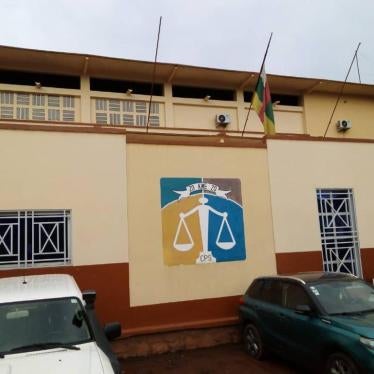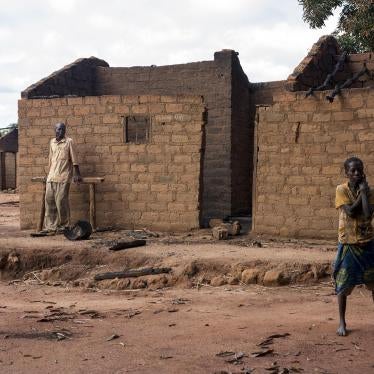(Nairobi) – The opening of the first trial at the Central African Republic’s Special Criminal Court (SCC) on April 19, 2022 represents significant progress in the difficult effort to see justice for grave crimes committed in the country, Human Rights Watch said today. Human Rights Watch issued a question-and-answer document ahead of the SCC’s trial.
The case involves war crimes and crimes against humanity committed in May 2019 in Koundjili and Lemouna allegedly by the suspects, Issa Sallet Adoum, Ousman Yaouba, and Tahir Mahamat, members of the “3R” rebel group. Human Rights Watch has documented the events.
“The Special Criminal Court’s first trial is a landmark moment for victims in the Central African Republic who have repeatedly called for justice for heinous crimes committed during successive conflicts in the country,” said Esti Tambay, senior International Justice counsel at Human Rights Watch. “This novel court – which combines international and domestic experience to hold those responsible for grave crimes to account – could be an important justice model for other countries to consider.”
The SCC became operational in 2018 to help limit widespread impunity for serious crimes in the Central African Republic. The court is staffed by both international and national judges and prosecutors, and benefits from international assistance. It has the authority to try grave crimes committed during the country’s armed conflicts since 2003.
The question-and-answer document covers:
- Background on the Special Criminal Court, its significance, and the challenges it has faced in becoming operational;
- What the first trial is about and how it will proceed, including efforts to make it accessible to local communities;
- What other cases the SCC is investigating and what other suspects it has charged,
- Key features of the court’s procedure, including how defendants and victims interact with the court; and
- How the SCC relates to the International Criminal Court’s (ICC) investigations in the Central African Republic, as well as to domestic prosecutions.
The SCC is conducting investigations in tandem with the ICC, the global permanent court of last resort, which currently has four suspects in custody regarding charges of crimes committed in the Central African Republic. The ICC can play an important role in pursuing cases involving more senior leadership, while the SCC seeks to conduct trials in a wider set of cases in the country’s capital, Bangui.
“The courts should be strategic in their coordination to maximize their combined efforts at securing justice,” Tambay said. “All countries committed to justice have an important role to play in supporting these courts with much-needed funding and to carry out arrests.”








